The phrase stay woke has been present in AAVE since the 1930s. In some contexts, it referred to an awareness of social and political issues affecting African Americans. The phrase was uttered in recordings from the mid-20th century by Lead Belly and, post-millennium, by Erykah Badu.
The term woke gained further popularity in the 2010s. Over time, it became increasingly connected to matters beyond race such as gender and identities perceived as marginalized. During the 2014 Ferguson protests, the phrase was popularized by Black Lives Matter (BLM) activists seeking to raise awareness about police shootings of African Americans. After the term was used on Black Twitter, woke was increasingly used by white people, who often used it to signal their support for BLM; some commentators criticized this usage as cultural appropriation. The term became popular with millennials and members of Generation Z. As its use spread internationally, woke was added to the Oxford English Dictionary in 2017.
By 2020, the term became a sarcastic pejorative among many on the political right and some centrists in Western countries, targeting various leftist and progressive movements. Woke was seen as offensive by commentators who felt it disparaged advocates of identity and race-related ideologies. Subsequently, terms like woke-washing and woke capitalism emerged to criticize those using social or political causes for financial or political gain, rather than sincere commitment, a phenomenon often referred to as "performative activism".
フレーズ「stay woke」は、1930年代からAAVEで使用されている。ある文脈では、アフリカ系アメリカ人に影響を与える社会問題や政治問題への意識を指していた。 このフレーズは、20世紀中期のリード・ベリーや、ミレニアム以降のエリカ・バドゥの録音で発せられた。
「 woke 」という言葉は、2010年代にさらに人気が高まった。時が経つにつれ、この言葉は人種以外の問題、例えばジェンダーや周縁化されていると認識されるアイ デンティティとますます結び付けられるようになった。2014年のファーガソン抗議デモでは、アフリカ系アメリカ人に対する警察の銃撃事件に対する認識を 高めることを目指した Black Lives Matter (BLM) の活動家たちによって、このフレーズが広まった。この言葉がブラック・ツイッターで使用された後、 woke は白人層の間でますます使用されるようになり、彼らはしばしば BLM への支持を示すためにこの言葉を使用した。一部の評論家は、この使用法を文化の盗用であると批判した。この言葉はミレニアル世代やジェネレーションZの間 で人気となった。その使用が国際的に広まるにつれ、2017年に「 woke 」はオックスフォード英語辞典に追加された。
2020年までに、この言葉は欧米諸国の多くの右派や一部の中道派の間で、さまざまな左派や進歩的運動をターゲットにした皮肉的な蔑称となった。 woke は、アイデンティティや人種に関するイデオロギーの擁護者を蔑視していると考える論評家たちから不快なものとして捉えられた。その後、 woke-washing(目を覚ました洗脳)や woke capitalism(目を覚ました資本主義)といった用語が登場し、社会運動や政治運動を金銭的利益や政治的影響力の獲得のために利用している人々を批 判するようになった。このような現象はしばしば「パフォーマティビティ・アクティヴィズム」と呼ばれる。
Wake up Ethiopia! Wake up Africa! Let us work towards the one glorious end of a free, redeemed and mighty nation. —Marcus Garvey, Philosophy and Opinions (1923)[3][5][6]
In some varieties of African-American English, woke is used in place of woken, the usual past participle form of wake.[7] This has led to the use of woke as an adjective equivalent to awake, which has become mainstream in the United States.[7][8]
While it is not known when being awake was first used as a metaphor for political engagement and activism, one early example in the United States was the paramilitary youth organization the Wide Awakes, which formed in Hartford, Connecticut, in 1860 to support the Republican candidate in the 1860 presidential election, Abraham Lincoln. Local chapters of the group spread rapidly across northern cities in the ensuing months and "triggered massive popular enthusiasm" around the election. The political militancy of the group also alarmed many southerners, who saw in the Wide Awakes confirmation of their fears of northern, Republican political aggression. The support among the Wide Awakes for abolition, as well as the participation of a number of black men in a Wide Awakes parade in Massachusetts, likely contributed to such anxiety.[9][10]
20th century
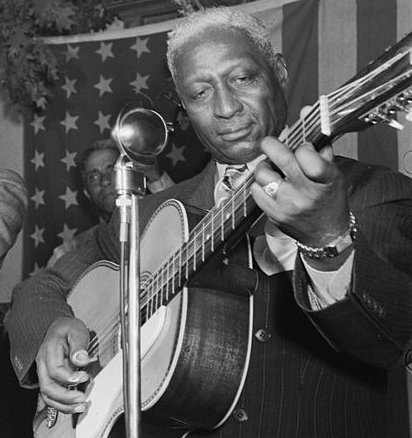
Folk singer-songwriter Lead Belly used the phrase "stay woke" on a recording of his song "Scottsboro Boys".
Among the earliest uses of the idea of wokeness as a concept for black political consciousness came from Jamaican philosopher and social activist Marcus Garvey,[3] who wrote in 1923, "Wake up Ethiopia! Wake up Africa!"[3][6]
A 1923 collection of aphorisms, ideas, and other writing by Garvey also adopts this metaphor in the following epigram: "Wake up Ethiopia! Wake up Africa! Let us work towards the one glorious end of a free, redeemed and mighty nation. Let Africa be a bright star among the constellation of nations."[6][3]
Black American folk singer-songwriter Huddie Ledbetter, a.k.a. Lead Belly, used the phrase "stay woke" as part of a spoken afterword to a 1938 recording of his song "Scottsboro Boys", which tells the story of nine black teenagers and young men falsely accused of raping two white women in Alabama in 1931. In the recording, Lead Belly says he met with the defendant's lawyer and the young men themselves, and "I advise everybody, be a little careful when they go along through there (Scottsboro) – best stay woke, keep their eyes open."[3][11] Aja Romano writes at Vox that this usage reflects "black Americans' need to be aware of racially motivated threats and the potential dangers of white America."[3]
By the mid-20th century, woke had come to mean 'well-informed' or 'aware',[12] especially in a political or cultural sense.[7] The Oxford English Dictionary traces the earliest such usage to a 1962 New York Times Magazine article titled "If You're Woke You Dig It" by African-American novelist William Melvin Kelley, describing the appropriation of black slang by white beatniks.[7]
Woke had gained more political connotations by 1971 when the play Garvey Lives! by Barry Beckham included the line: "I been sleeping all my life. And now that Mr. Garvey done woke me up, I'm gon' stay woke. And I'm gon help him wake up other black folk."[13][14]
2008–2014: #Staywoke hashtag
Through the late 2000s and early 2010s, woke was used either as a term for literal wakefulness, or as slang for suspicions of infidelity.[3] The latter meaning was used in singer Childish Gambino's 2016 song "Redbone".[15] In the 21st century's first decade, the use of woke encompassed the earlier meaning with an added sense of being "alert to social and/or racial discrimination and injustice".[7]
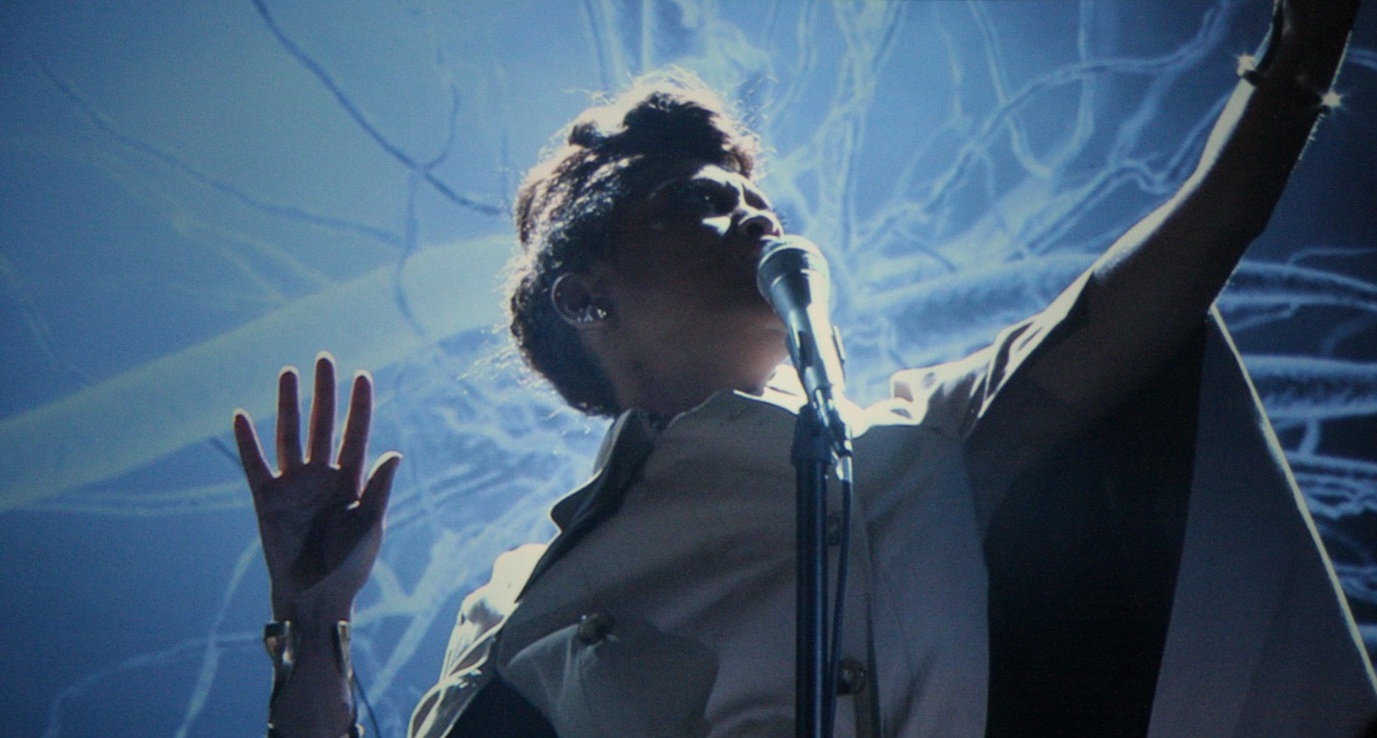
"Master Teacher", a 2008 song by the American singer Erykah Badu (pictured in 2012) included the term stay woke.
This usage was popularized by soul singer Erykah Badu's 2008 song "Master Teacher",[8][12] via the song's refrain, "I stay woke".[13] Merriam-Webster defines the expression stay woke in Badu's song as meaning, "self-aware, questioning the dominant paradigm and striving for something better"; and, although within the context of the song, it did not yet have a specific connection to justice issues, Merriam-Webster credits the phrase's use in the song with its later connection to these issues.[8][16]
Songwriter Georgia Anne Muldrow, who composed "Master Teacher" in 2005, told Okayplayer news and culture editor Elijah Watson that while she was studying jazz at New York University, she learned the invocation Stay woke from Harlem alto saxophonist Lakecia Benjamin, who used the expression in the meaning of trying to "stay woke" because of tiredness or boredom, "talking about how she was trying to stay up – like literally not pass out". In homage, Muldrow wrote stay woke in marker on a T-shirt, which over time became suggestive of engaging in the process of the search for herself (as distinct from, for example, merely personal productivity).[17]
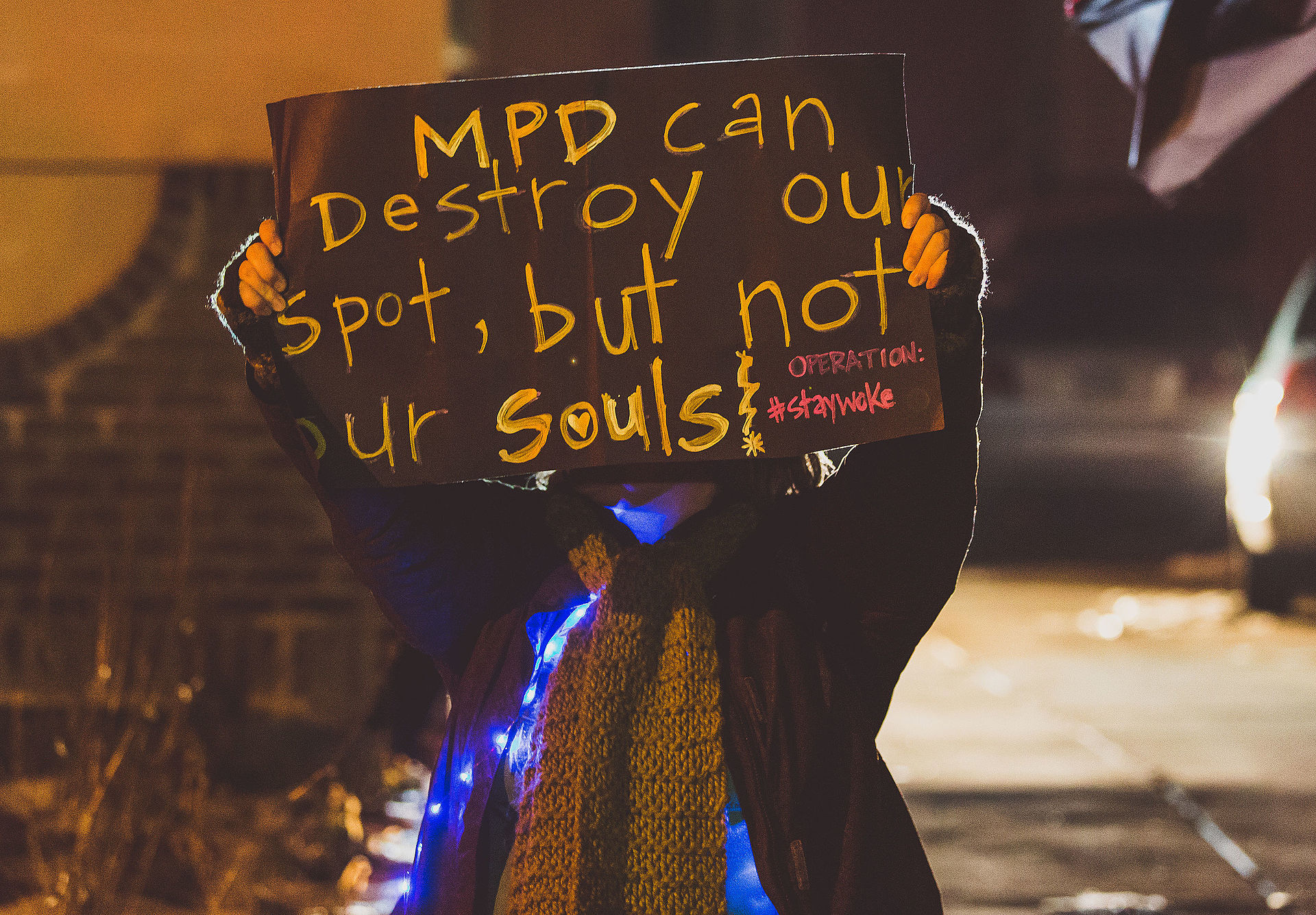
"#StayWoke" hashtag on a placard during a December 2015 protest in Minneapolis
According to The Economist, as the term woke and the #Staywoke hashtag began to spread online, the term "began to signify a progressive outlook on a host of issues as well as on race".[18] In a tweet mentioning the Russian feminist rock group Pussy Riot, whose members had been imprisoned in 2012,[19][20] Badu wrote: "Truth requires no belief. Stay woke. Watch closely. #FreePussyRiot".[21][22][23] This has been cited by Know Your Meme as one of the first examples of the #Staywoke hashtag.[24]
2014–2015: Black Lives Matter
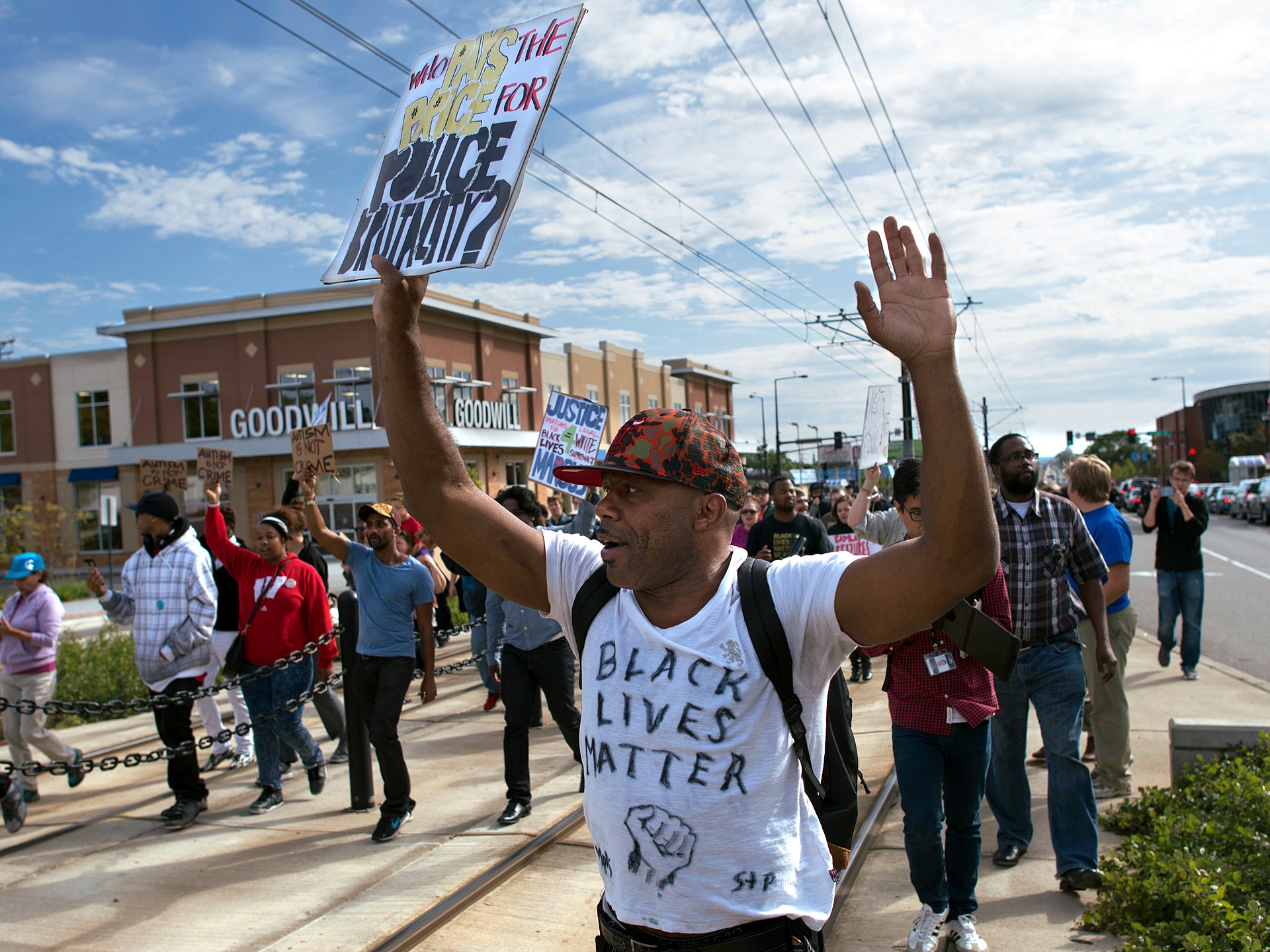
A 2015 protest in St. Paul by Black Lives Matter supporters against police brutality
Following the shooting of Michael Brown in 2014, the phrase stay woke was used by activists of the Black Lives Matter (BLM) movement to urge awareness of police abuses.[3][25][24] The BET documentary Stay Woke, which covered the movement, aired in May 2016.[26] Within the decade of the 2010s, the word woke (the colloquial, passively voiced past participle of wake) obtained the meaning 'politically and socially aware'[27] among BLM activists.[7][25]
2015–2019: Broadening usage
While the term woke initially pertained to issues of racial prejudice and discrimination impacting African Americans, it came to be used by other activist groups with different causes.[4] While there is no single agreed-upon definition of the term, it came to be primarily associated with ideas that involve identity and race and which are promoted by progressives, such as the notion of white privilege or slavery reparations for African Americans.[28] Vox's Aja Romano writes that woke evolved into a "single-word summation of leftist political ideology, centered on social justice politics and critical race theory".[3] Columnist David Brooks wrote in 2017 that "to be woke is to be radically aware and justifiably paranoid. It is to be cognizant of the rot pervading the power structures."[29] Sociologist Marcyliena Morgan contrasts woke with cool in the context of maintaining dignity in the face of social injustice: "While coolness is empty of meaning and interpretation and displays no particular consciousness, woke is explicit and direct regarding injustice, racism, sexism, etc."[2]
The term woke became increasingly common on Black Twitter, the community of African American users of the social media platform Twitter.[15] André Brock, a professor of black digital studies at the Georgia Institute of Technology, suggested that the term proved popular on Twitter because its brevity suited the platform's 140-character limit.[15] According to Charles Pulliam-Moore, the term began crossing over into general internet usage as early as 2015.[30] The phrase stay woke became an Internet meme,[16] with searches for woke on Google surging in 2015.[4]
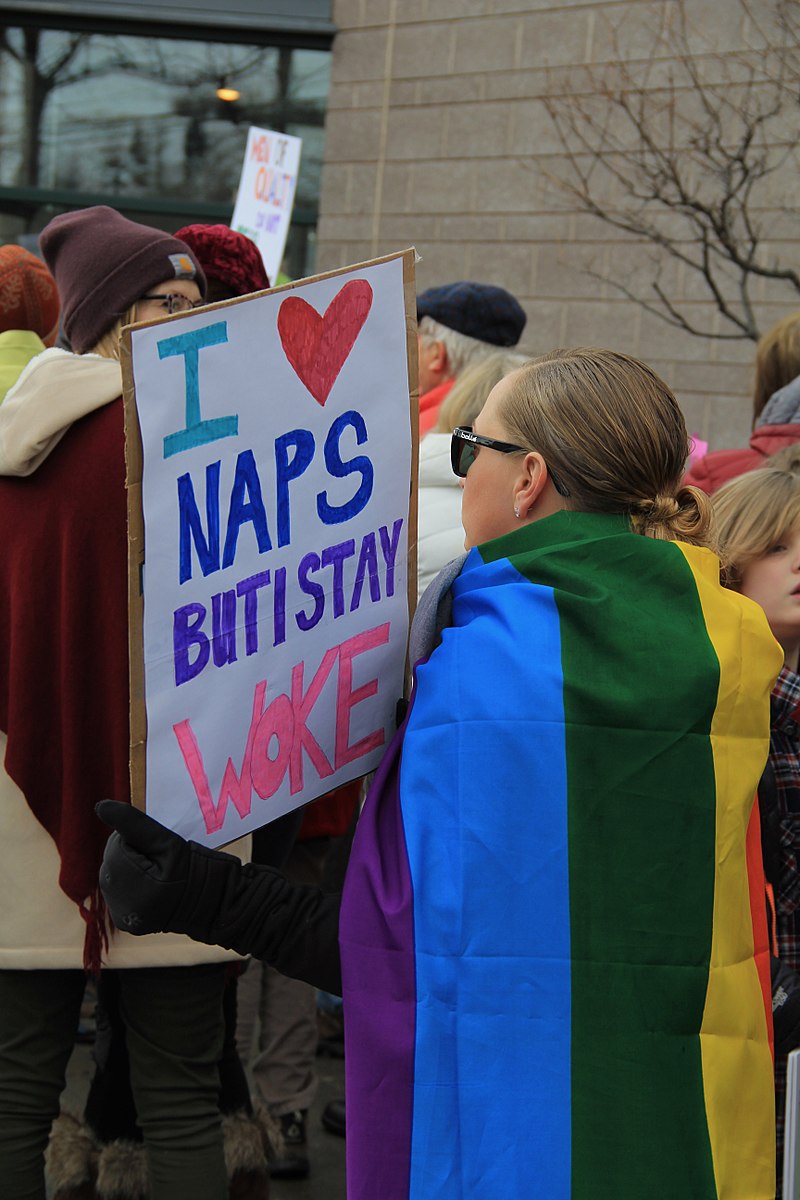
A woman draped in a rainbow flag and wearing sunglasses, standing with her back to the camera and holding a hand-lettered sign reading, "I [heart symbol] Naps But I Stay Woke"
Protester at a 2018 Women's March event in Missoula, Montana
The term has gained popularity amid an increasing leftward turn on various issues among the American Left; this has partly been a reaction to the right-wing politics of U.S. President Donald Trump, who was elected in 2016, but also to a growing awareness regarding the extent of historical discrimination faced by African Americans.[31] According to Perry Bacon Jr., ideas that have come to be associated with "wokeness" include a rejection of American exceptionalism; a belief that the United States has never been a true democracy; that people of color suffer from systemic and institutional racism; that white Americans experience white privilege; that African Americans deserve reparations for slavery and post-enslavement discrimination; that disparities among racial groups, for instance in certain professions or industries, are automatic evidence of discrimination; that U.S. law enforcement agencies are designed to discriminate against people of color and so should be defunded, disbanded, or heavily reformed; that women suffer from systemic sexism; that individuals should be able to identify with any gender or none; that U.S. capitalism is deeply flawed; and that Trump's election to the presidency was not an aberration but a reflection of the prejudices about people of color held by large parts of the U.S. population.[31] Although increasingly accepted across much of the American Left, many of these ideas were nevertheless unpopular among the U.S. population as a whole and among other, especially more centrist, parts of the Democratic Party.[31]
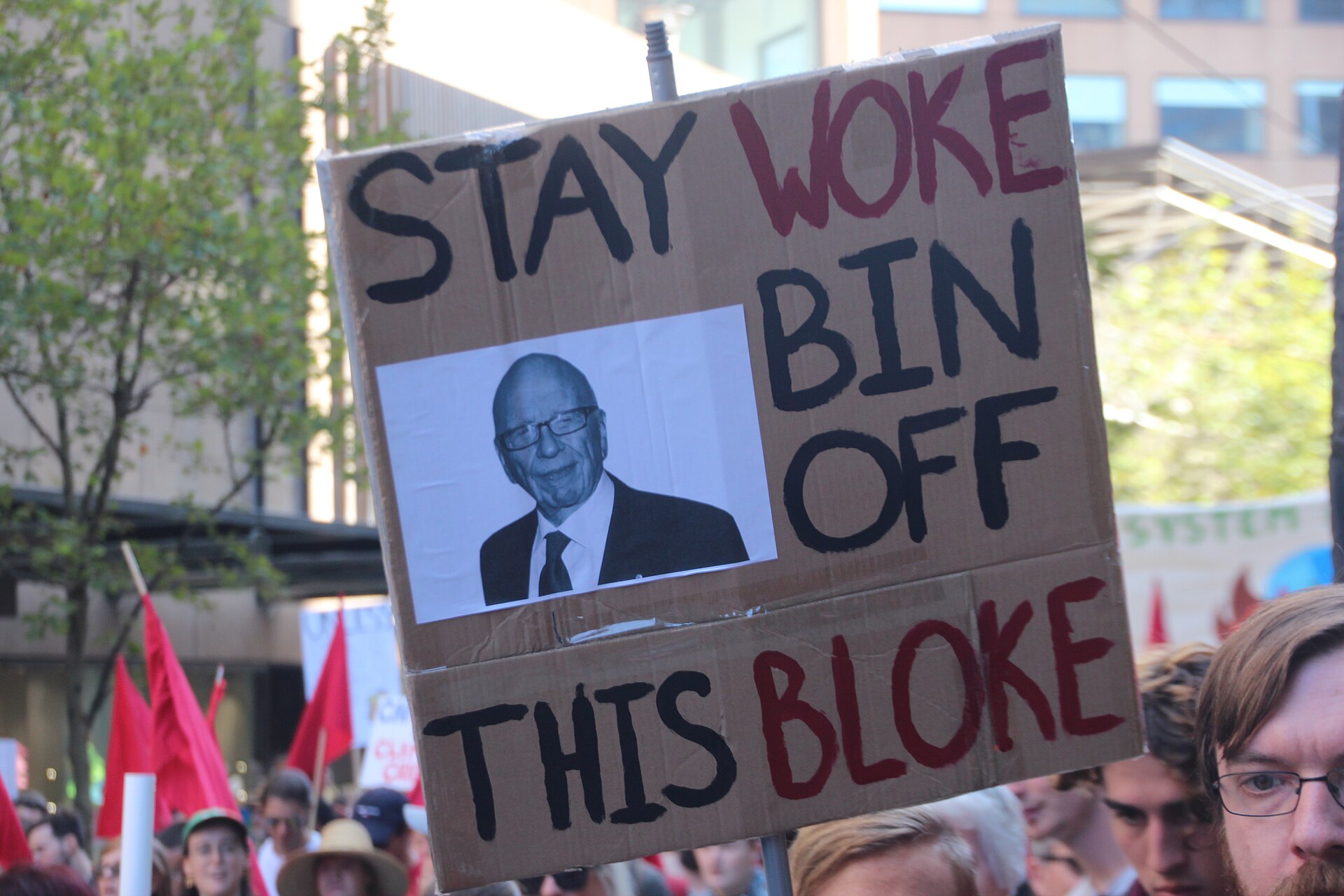
Cardboard sign at a street demonstration reading "Stay Woke – Bin Off this Bloke" with a picture of Rupert Murdoch
Placard criticising media mogul Rupert Murdoch at an environmentalist protest in Melbourne, Australia in 2020
The term increasingly came to be identified with millennials[15] and members of Generation Z.[32] In May 2016, MTV News identified woke as being among ten words teenagers "should know in 2016".[33][15] The American Dialect Society voted woke the slang word of the year in 2017.[34][35][36] In the same year, the term was included as an entry in Oxford English Dictionary.[37][7] By 2019, the term woke was increasingly being used in an ironic sense, as reflected in the books Woke by comedian Andrew Doyle (using the pen name Titania McGrath) and Anti-Woke by columnist Brendan O'Neill.[38] By 2022, usage of the term had spread beyond the United States, attracting criticism by right-wing political figures in Europe.[39]
2019–present: as a pejorative
By 2019,[40] opponents of progressive social movements were often using the term mockingly or sarcastically,[3][41] implying that "wokeness" was an insincere form of performative activism.[3][42] British journalist Steven Poole comments that the term is used to mock "overrighteous liberalism".[40] In this pejorative sense, woke means "following an intolerant and moralising ideology".[18]
United States
Among American conservatives and some centrists, woke has come to be used primarily as an insult.[3][28][42] Members of the Republican Party have been increasingly using the term to criticize members of the Democratic Party, while more centrist Democrats use it against more left-leaning members of their own party; such critics accuse those on their left of using cancel culture to damage the employment prospects of those who are not considered sufficiently woke.[28][43] Perry Bacon Jr. suggests that this "anti-woke posture" is connected to a long-standing promotion of backlash politics by the Republican Party, wherein it promotes white and conservative fear in response to activism by African Americans as well as changing cultural norms.[28][44] Such critics often believe that movements such as Black Lives Matter exaggerate the extent of social problems.[41]
Among the uses by Republicans is the Stop WOKE Act, a law that limits discussion of racism in Florida schools. A program of eliminating books by LGBT and black authors from schools was conducted by the Florida government and by vigilantes calling themselves "woke busters".[45]
Linguist and social critic John McWhorter argues that the history of woke is similar to that of politically correct, another term once used self-descriptively by the left which was appropriated by the right as an insult, in a process similar to the euphemism treadmill.[46] Romano compares woke to canceled as a term for "'political correctness' gone awry" among the American right wing.[3] Attacking the idea of wokeness, along with other ideas such as cancel culture and critical race theory,[47] became a large part of Republican Party electoral strategy. Former President Donald Trump stated in 2021 that the Biden administration was "destroying" the country "with woke", and Republican Missouri senator Josh Hawley used the term to promote his upcoming book by saying the "woke mob" was trying to suppress it.[42] According to USA Today, the term woke has been "co-opted by GOP activists".[48]
Woke mind virus
Woke mind virus is a neologism popular with right-leaning and conservative commentators, especially in the United States. The term is used to refer to anything which is perceived to be closely connected to left-wing politics, with emphasis on actions or ideas believed to threaten freedom of speech.[49] The term was first popularized in 2021 when Elon Musk began using it on Twitter.[50][51] Florida governor and former presidential candidate Ron DeSantis has frequently used the term.[52][53]
Asia
In India, the term is used as a pejorative by Hindutva activists and Hindu nationalists to refer to the critics of the Hindu nationalist ideology who are deemed as "anti-Hindu" by the Hindu nationalist organizations such as the Rashtriya Swayamsevak Sangh.[54][55] The term is also synonymous with leftism in news headlines[56] and is commonly used in social media circles by critics of secularism in India.[57]
Canada
The term is widely used in Canada as in the United States to describe overly progressive politics.[58] During a debate in 2023 on the Law Society of Alberta's 2020 adoption of a rule which made certain Continuing Professional Development (CPD) training courses on Indigenous Canadian history obligatory, a lawyer from the Justice Centre for Constitutional Freedoms wrote an op-ed arguing that the course was a form of "wokeness".[59][60]
France
The phenomenon le wokisme (sometimes translated 'wokeism'[61]) has also seen use in French politics, particularly since the 2022 French presidential election.[62][63][64][65] Much of the opposition to le wokisme sees it as an American import, incompatible with French values.[61] Then-education minister Jean-Michel Blanquer established an "anti-woke think tank" in opposition to what is perceived as an export from the English-speaking world.[61][66][39] According to French sociologist and political scientist Alain Policar [fr], the term "woke" which originated from African American communities to describe awareness of social injustices, has been used pejoratively by French politicians from the former republican left, the right and the far right to label individuals engaged in anti-racist, feminist, LGBT, and environmental movements.[67] This derogatory usage gave rise to the noun "wokisme", suggesting a homogeneous political movement propagating an alleged "woke ideology".[68][69]
French philosopher Pierre-Henri Tavoillot characterizes "wokeism" as a corpus of theories revolving around "identity, gender and race", with the core principle of "revealing and condemning concealed forms of domination", positing that all aspects of society can be reduced to a "dynamic of oppressor and oppressed", with those oblivious to this notion deemed "complicit", while the "awakened (woke)" advocate for the "abolition (cancel) of anything perceived to sustain such oppression", resulting in practical implementations such as adopting inclusive language, reconfiguring education or deconstructing gender norms.[70]
United Kingdom
In the United Kingdom, public debate about woke has been driven by media commentary. Conservative papers such as The Daily Telegraph and Daily Mail commonly publish articles critical of what they term to be "woke".[citation needed] The Mail on Sunday publishes an annual "Woke List" criticising public figures for perceived "virtue signalling".[71][better source needed]
The term "woke" is often used as a pejorative by conservative figures.[39] While promoting her book The Abuse of Power in 2023, former British Conservative Party prime minister Theresa May declared herself to be woke, in the sense of "somebody who recognizes that discrimination takes place".[72][73]
In a survey by YouGov, 73% of Britons who used the term said they did so in a disapproving way and 11% in an approving way.[74]
Europe
In Hungary, Hungarian politician Balázs Orbán stated that "we [Hungary] will not give up fighting against woke ideology".[75]
In Switzerland, politicians from and supporters of the right-wing Swiss People's Party criticized Swiss bank UBS for "woke culture".[76]
Oceania
During the 2022 Australian federal election campaign, both Scott Morrison, then-prime minister and leader of the centre-right Liberal-National Coalition, and Anthony Albanese, the current prime minister and leader of the centre-left Australian Labor Party, insisted they were not "woke".[77] Peter Dutton, current Opposition Leader and leader of the Coalition, has also used the term several times before.[78][79] Members of minor right-wing parties, especially Pauline Hanson's One Nation and the United Australia Party, also frequently use the term.
In New Zealand, former deputy prime minister and leader of the New Zealand First Party, Winston Peters, referred to the government led by Jacinda Ardern and the New Zealand Labour Party as a "woke guilt industry".[80] Then–opposition leader Judith Collins also referred to Ardern as "woke".[81]
At the 2024 Queensland local government elections, "Say NO to WOKE" was registered as a group for the Toowoomba Regional Council. It ran two candidates but did not win any seats.[82]
エチオピアよ、目を覚ませ!アフリカよ、目を覚ませ!自由で、救済され、強大な国家という一つの輝かしい目標に向かって共に歩もう。—マーカス・ガーベイ 『Philosophy and Opinions』(1923年)[3][5][6]
アフリカ系アメリカ人の英語の一部の方言では、wakeの一般的な過去分詞形であるwokenの代わりにwokeが使われることがある[7]。これによ り、wokeが形容詞として、wakeと同義語として使われるようになり、アメリカでは主流となっている[7 ][8]
目覚めていることが政治的な関与や活動を表す比喩としていつ頃から使われ始めたのかは不明だが、米国における初期の事例としては、1860年の大統領選挙 で共和党候補のアブラハム・リンカーンを支援するためにコネチカット州ハートフォードで結成された準軍事的な青年組織「ワイド・アウェイクス」が挙げられ る。このグループの支部はその後数か月の間に北部の都市に急速に広がり、選挙をめぐる「大規模な民衆の熱狂」の引き金となった。このグループの政治的な過 激さは、多くの南部住民を不安に陥れた。南部住民は、ワイド・アウェイクスの存在を、北部や共和党の政治的な攻撃に対する自分たちの不安を裏付けるものと 捉えたのだ。ワイド・アウェイクスの奴隷廃止支持や、マサチューセッツ州で行われたワイド・アウェイクスのパレードに多数の黒人男性が参加したことも、こ うした不安を助長したと思われる[9][10]。
20世紀

フォークシンガーソングライターのリード・ベリーは、自身の曲「スコットボロー・ボーイズ」のレコーディングで「stay woke(目を覚まし続けろ)」というフレーズを使用している。
黒人の政治的意識の概念としての「目覚め」という概念の最も初期の用法の一つは、ジャマイカの哲学者であり社会活動家でもあったマーカス・ガーベイによる ものである[3]。ガーベイは1923年に「エチオピアよ、目を覚ませ!アフリカよ、目を覚ませ!」と記している[3][6]。
1923年に出版されたガーベイの格言集、思想、その他の著作でも、次のような警句でこの比喩が用いられている。「エチオピアよ、目を覚ませ!アフリカ よ、目を覚ませ!自由で、救済され、強大な国家という一つの輝かしい目標に向かって努力しよう。アフリカを国家の星座の中で輝く星にしよう」[6] [3]。
黒人アメリカ人のフォークシンガーソングライター、ハディ・レッドベター(別名:リード・ベリー)は、1938年に録音した「Scottsboro Boys」という曲の口述による後書きで「stay woke」というフレーズを使用しました。この曲は、1931年にアラバマ州で2人の白人女性をレイプしたとして誤って起訴された9人の黒人のティーンエ イジャーと若い男性たちの物語です。録音の中で、リード・ベリーは、被告の弁護士と若者たち本人たちに会ったと述べ、「私は皆に忠告する。スコットズボロ を通る際には少し注意した方がいい。目を覚まし、目を大きく開けておくことだ」と語っている[3][11]。VoxでAja Romanoは、この用法が「黒人アメリカ人の 人種差別的な脅威や白人アメリカが潜在的に持つ危険性について認識しておく必要がある」[3]
20世紀半ばまでに、 woke は「よく知っている」や「認識している」という意味を持つようになった[12]、特に政治や文化的な意味で[7]。オックスフォード英語辞典は、このよう な最古の使用例を1962年のニューヨーク・タイムズ・マガジンの記事「If You're Woke You Dig It」に遡っている。 1962年のニューヨークタイムズ・マガジンに掲載された、アフリカ系アメリカ人小説家のウィリアム・メルヴィン・ケリーによる「If You're Woke You Dig It」というタイトルの記事で、白人のビートニクによる黒人スラングの流用について述べているのが、最も古い使用例である[7]。
1971年、バリー・ベッカム作の舞台「ガーヴィー・ライブス!」に「I been sleeping all my life. And now that Mr. Garvey done woke me up, I'm gon' stay woke. And I'm gon help him wake up other black folk.」というセリフが登場し、Wokeという言葉はより政治的な意味合いを持つようになった[13][14]。「私はこれまでの人生でずっと眠って いた。そして今、ガーヴィー氏が私を覚醒させたので、私は覚醒したままでいるつもりだ。そして私は、他の黒人たちに彼が目覚めるのを手助けするつもりだ」 [13][14]
2008年~2014年: #Staywoke ハッシュタグ
2000年代後半から2010年代初頭にかけて、 woke は文字通りの覚醒を表す言葉として、あるいは不貞の疑いを示す俗語として使われた[3]。後者の意味は、シンガーのチャイルディッシュ・ガンビーノの 2016年の曲「Redbone」で使用された[15]。21世紀最初の10年間、 woke の使用は、以前の意味に加えて、「社会や人種差別、不正義に敏感である」という意味も含まれるようになった[7]。

アメリカの歌手エリカ・バドゥ(2012年撮影)の2008年の曲「Master Teacher」には、stay woke という用語が含まれている。
この用法を広めたのは、ソウルシンガーのエリカ・バドゥが2008年に発表した曲「Master Teacher」である[8][12]。この曲のサビの「I stay woke」という言葉がきっかけとなった[13]。Merriam-Websterは、バドゥの曲で用いられている「stay woke」という表現を、「自覚的であり、支配的なパラダイムに疑問を呈し、より良いものを追求する」という意味であると定義している 」と定義している。また、この表現は歌の中ではまだ正義の問題と具体的な関連性を持っていなかったが、メリアム・ウェブスターは、後にこの表現が正義の問 題と関連付けられるようになったのは、この歌での使用によると述べている[8][16]。
2005年に「Master Teacher」を作曲したソングライターのジョージア・アン・マルドロウは、Okay プレイヤーニュースとカルチャーエディターのイライジャ・ワトソンに、ニューヨーク大学でジャズを学んでいたときに、ハーレム出身のアルトサックス奏者レ イクシア・ベンジャミンが「Stay woke(目を覚まし続けろ)」という表現を、疲れや退屈を理由に「文字通り気を失わないように目を覚まし続けようとする」という意味で使用していること を知ったと語った。これに敬意を表して、マルドロウはTシャツに「stay woke」とマーカーで書き込んだ。やがてそれは、単なる個人的な生産性とは区別される、自分自身を探すプロセスに従事していることを示唆するものとなっ た[17]。

2015年12月のミネアポリスでの抗議デモで掲げられたプラカードに書かれた「#StayWoke」のハッシュタグ
エコノミスト誌によると、オンライン上で「#Staywoke」のハッシュタグとともに「Woke」という言葉が広まり始めたことで、この言葉は「人種問 題だけでなく、さまざまな問題に対する進歩的な見方を表すようになった」[18]。さまざまな問題や人種問題に対する進歩的な見解を意味し始めた」 [18]。バドゥは、2012年にメンバーが投獄されたロシアのフェミニスト・ロックグループ、プッシー・ライオットについて言及したツイートで、「真実 には信念は必要ない。目を覚まし続けろ。よく見張れ。#FreePussyRiot」[21][22][23]。これはKnow Your Memeによって、#Staywokeハッシュタグの最初の例のひとつとして引用されている[24]。
2014年~2015年: ブラック・ライヴズ・マター

2015年、セントポールで警察の暴力を非難するブラック・ライヴズ・マター支持者による抗議活動
2014年のマイケル・ブラウンの銃撃事件を受けて、ブラック・ライヴズ・マター(BLM)運動の活動家たちは、警察の虐待に対する認識を促すために 「stay woke」というフレーズを使用した[3][25][24]。この運動を取り上げたBETのドキュメンタリー『Stay Woke』は、2016年5月に放映された[26]。2010年代10年の間に、 woke(wakeの口語的、受動態の過去分詞)という言葉は、BLMの活動家たちの間で「政治や社会問題に対する意識が高い」という意味を持つように なった[27][7][25]。
2015年~2019年: 使用範囲の拡大
当初、 woke という用語はアフリカ系アメリカ人に影響を与える人種的偏見や差別に関する問題を指していたが、異なる原因を持つ他の活動家グループでも使用されるように なった[4]。この用語について合意された定義はないが、主にアイデンティティや人種に関する考えと結びつけられ、進歩主義者によって推進されるように なった。特権やアフリカ系アメリカ人に対する奴隷制賠償といった概念などである[28]。VoxのAja Romanoは、 wokeは「社会正義政治と批判的人種理論を中心とした左翼政治イデオロギーを一言で要約したもの」へと進化したと書いている[3]。コラムニストの David Brooksは2017年に、「 wokeであるということは、根本的に自覚的であり、正当に偏執的であるということだ。権力構造に蔓延する腐敗に気づくことである」[29]。社会学者 Marcyliena Morgan は、社会的不公正に直面した際の尊厳の維持という文脈で woke と cool を対比している。「クールさは意味も解釈もなく、特定の意識も示さないが、 woke は不正義、人種差別、性差別などに関して明確かつ直接的である」[2]。
woke という用語は、アフリカ系アメリカ人のソーシャルメディアプラットフォーム Twitter ユーザーによるコミュニティ「Black Twitter」で次第に一般的になった[15]。ジョージア工科大学の黒人デジタル研究教授であるアンドレ・ブロックは、この用語が Twitter で人気を博したのは、その簡潔さが Twitter の 140 文字という制限に合っていたからだと指摘した。 15] チャールズ・プリリアム=ムーアによると、この言葉は2015年という早い時期からインターネット上の一般的な用語として使われるようになった[30]。

虹色の旗を身にまとい、サングラスをかけた女性がカメラに背を向けて立ち、手書きで「I [ハートマーク] Naps But I Stay Woke(昼寝はするが、私は目覚めている)」と書かれたプラカードを手にしている。 ] 昼寝はするが、目を覚まし続ける
2018年、モンタナ州ミズーラで開催されたウィメンズ・マーチに参加した抗議者
この言葉は、アメリカの左派の間でさまざまな問題に対する左傾化が進む中で人気を集めている。これは、2016年に当選したドナルド・トランプ大統領の右 派政治に対する反発であると同時に、アフリカ系アメリカ人が歴史的に受けてきた差別の程度に対する認識の高まりにも起因している[31]。ペリー・ベーコ ン・ジュニアによると、「目覚め」と関連付けられるようになった考えには、アメリカ例外主義の否定、アメリカは真の民主主義国家であったことがないという 信念、有色人種は組織的・制度的人種差別に苦しんでいるという信念、白人アメリカ人は白人特権を経験している、アフリカ系アメリカ人は奴隷制と奴隷制後の 差別に対する賠償を受けるべきである、特定の職業や産業における人種間の格差は自動的に差別を証明する証拠である、米国の 。法執行機関は有色人種に対する差別を意図して設計されているため、資金提供を打ち切り、解散、または大幅な改革を行うべきである。女性は組織的な性差別 に苦しんでいる。個人はどの性別にも、あるいはどちらにも属さないことを選択できるべきである。米国の資本主義には重大な欠陥がある。トランプが大統領に 当選したのは異常な事態ではなく、米国人口の大半が抱く有色人種に対する偏見を反映したものである。 1] アメリカの左派の間で受け入れられるようになってきているが、これらの考えの多くは、アメリカ国民全体や、特に中道寄りの民主党の他の部分では不人気だっ た。

「目を覚ませ - この男をビン詰めにしろ」と書かれた街頭デモの段ボール看板。ルパート・マードックの肖像画付き
2020年、オーストラリアのメルボルンで行われた環境保護活動家の抗議で、メディア王ルパート・マードックを批判するプラカード
この用語は ますますミレニアル世代[15]やジェネレーションZ[32]のメンバーと関連付けられるようになった。2016年5月、MTVニュースは、ティーンエイ ジャーが「2016年に知っておくべき」10の言葉の中に woke が含まれていると紹介した[33][15]。アメリカ方言学会は、2017年のスラング・オブ・ザ・イヤーに woke を選出した[34][35][36]。同年、この言葉は オックスフォード英語辞典の項目にも含まれるようになった[37][7]。2019年までに、この「 woke 」という言葉は皮肉的な意味で使われることが多くなり、コメディアンのアンドリュー・ドイル(ペンネームはティターニア・マグラス)の著書『Woke』や コラムニストのブレンダン・オニールの著書『Anti-Woke』にも反映されている[38]。2022年までに、この言葉の使用はアメリカ国外にも広が り、ヨーロッパの右翼政治家の批判を集めた[39]。
2019年~現在:蔑称として
2019年までに[40]、進歩的社会運動の反対派はしばしばこの言葉を嘲笑的または皮肉的に使用し、「目覚め」は不誠実なパフォーマティビティ・アク ティヴィズムの形であると示唆していた[3][41]。イギリスのジャーナリスト、スティーブン・プールは、この言葉は「過剰に正義感の強いリベラリズ ム」を嘲笑するために使用されているとコメントしている[40]。「独善的なリベラリズム」を嘲笑するために使われていると、イギリスのジャーナリスト、 スティーブン・プールはコメントしている[40]。この蔑称的な意味で、 woke は「不寛容で道徳を説くイデオロギーに従う」ことを意味する[18]。
アメリカ合衆国
アメリカの保守派や一部の中道派の間では、 woke は主に侮辱として使われるようになった[3][28][42]。共和党員は民主党員を批判するためにこの言葉を使うことが増えている一方、 一方、より中道派の民主党員は、より左寄りの党員に対してこの言葉を使う。このような批判者は、左派の人々が十分に目覚めていないと見なされる人々の雇用 見通しを損なうためにキャンセル・カルチャーを利用していると非難している[28][43]。ペリー・ベーコン・ジュニアは、この「反目覚めた姿勢」が、 共和党による長年にわたる反発政治の推進と関係しているとしている これは、アフリカ系アメリカ人の活動や文化規範の変化に対する反応として、白人や保守派に恐怖心を煽るものである。このような批判者は、Black Lives Matterなどの運動が社会問題の深刻さを誇張していると考えることが多い[41]。
共和党による利用の例としては、フロリダ州の学校で人種差別に関する議論を制限する法律である「Stop WOKE Act」がある。LGBTや黒人作家の本を学校から排除するプログラムは、フロリダ州政府と「 woke busters(目覚めた破壊者)」を自称する自警団によって実施された[45]。
言語学者で社会評論家のジョン・マクウォーターは、 woke の歴史はポリティカル・コレクトネス(PC)の歴史に似ていると主張している。ポリティカル・コレクトネスは、かつて左派が自嘲的に使っていた言葉で、右 派が侮辱として流用した 婉曲表現の悪循環と似たプロセスである。[46] ロマーノは、アメリカの右翼の間で「政治的な正しさ」が誤った方向に進んでしまったことを表す言葉として、 woke を canceled に例えている[3]。 woke の考え方を攻撃することは、キャンセル・カルチャーや批判的人種理論などの他の考え方を攻撃することと並んで、共和党の選挙戦略の大きな部分を占めるよう になった。ドナルド・トランプ前大統領は2021年に、バイデン政権が「 woke(目覚めた)」ことで国を「破壊している」と発言し、共和党のジョシュ・ホーリー上院議員(ミズーリ州選出)は、この言葉を使って自身の近著を宣 伝し、「 woke mob(目覚めた暴徒)」がそれを抑えつけようとしていると述べた 。[42]USAトゥデイによると、 woke という用語は「GOPの活動家たちに利用されている」[48]。
Woke mind virus
Woke mind virus は、特に米国で右派や保守派の論客の間で流行している新語である。この用語は、言論の自由を脅かすと考えられている行動や考え方を強調し、左翼政治と密接 に関連していると認識されているものすべてを指すために使用される[49]。この用語は、2021年にイーロン・マスクがTwitterで使い始めたこと で初めて広まった[50][51]。フロリダ州知事であり、元大統領候補のロン・デサンティスも頻繁にこの用語を使用している[52][53]。
アジア
インドでは、この用語は ヒンドゥー民族主義者によって、ラシュトラヤ・スワーヤムセヴァク・サンガなどのヒンドゥー民族主義団体が「反ヒンドゥー」と見なすヒンドゥー民族主義思 想の批判者を指す蔑称として使われている[54][55]。この用語はニュースの見出しでは左翼主義と同義語[56]であり、インドの世俗主義の批判者に よってソーシャルメディア界隈で一般的に使われている[57]。 カナダ
この言葉は、アメリカと同様にカナダでも、過度に進歩的な政治を表現するために広く使用されている[58]。2023年にアルバータ州弁護士会が2020 年に採択した、カナダ先住民の歴史に関する特定の継続的専門能力開発(CPD)研修コースの受講を義務付ける規則に関する議論の中で、憲法上の自由のため の正義センターに所属する弁護士が、このコースは「w 。[59][60]
フランス
le wokisme(「wokeism」と訳されることもある[61])という現象は、フランスの政治でも見られ、特に2022年のフランス大統領選挙以降、 顕著になっている[62][63][64][65]。le wokismeへの反対意見の多くは、それをアメリカの輸入品であり、フランスの価値観と相容れないものとみなしている[61]。当時の教育大臣ジャン= ミシェル・ブランケルは 英語圏からの輸出品とみなされるものに対抗して、「反 woke シンクタンク」を設立した[61][66][39]。フランスの社会学者で政治学者のアラン・ポリカール(Alain Policar)によると、アフリカ系アメリカ人コミュニティで生まれた「 woke 」という言葉は、社会的不公正に対する認識を表すために使われていたが、かつての共和左派、右派、極右のフランスの政治家たちによって、 反人種差別、フェミニズム、LGBT、環境保護運動に従事する個人をレッテル貼りにするために使用されている[67]。この蔑称の使用は、「 woke ideology(目覚めたイデオロギー)」を宣伝する均質な政治運動を示唆する名詞「wokisme(ウキズム)」を生み出した[68][69]。
フランスの哲学者ピエール=アンリ・タヴォイヨは、「 wokeism(ウキズム)」を「アイデンティティ、ジェンダー、人種」をめぐる理論体系と特徴づけ、その核心となる原則は「隠された支配形態を暴き、非 難すること」であると述べている。 支配の隠された形態を明らかにし、非難すること」を基本理念とし、社会のあらゆる側面は「抑圧者と被抑圧者の力学」に還元できるとし、この概念に気づかな い者は「共謀者」と見なされ、「目覚めた( woke)」擁護者は「そのような抑圧を維持すると考えられるものの廃止(キャンセル)」を提唱し、その結果、包括的な言語の採用、教育の再構成、ジェン ダー規範の脱構築などの実践的な実施につながるとする[70]。
イギリス
イギリスでは、メディアの論評によって woke についての公共の議論が活発化している。デイリー・テレグラフやデイリー・メールなどの保守系新聞は、「 woke 」と彼らが呼ぶものに対して批判的な記事を一般的に掲載している[出典が必要]。サンデー・メールは、公人が「美徳の誇示」をしているとみなして批判する 「 woke list 」を毎年発表している[71][より確かな情報源が必要]。
「 woke 」という言葉は、保守的な人物によってしばしば蔑称として使用される[39]。2023年に著書『The Abuse of Power』を宣伝している間、 2023年、元英国保守党首相のテリーザ・メイは、著書『The Abuse of Power』のプロモーションで、自身が「差別が行われていることを認識している人」という意味で「 woke 」であると宣言した[72][73]。
YouGovの調査では、この用語を使用した英国人の73%が否定的な意味で、11%が肯定的な意味で使用したと答えた[74]。
ヨーロッパ
ハンガリーでは、ハンガリーの政治家バル ハンガリーの政治家バル・
オーバンは、「われわれ(ハンガリー)は、 woke イデオロギーとの戦いを諦めない」と述べた[75]。
スイスでは、右派政党スイス国民党の政治家や支持者が、スイス銀行UBSを「 woke 文化」だと批判した[76]。
オセアニア
2022年のオーストラリア連邦選挙キャンペーン中、当時首相で中道右派政党自由国民党連合の党首だったスコット・モリソンと 、そして現職首相で中道左派のオーストラリア労働党党首のアンソニー・アルバネーゼは、自分は「 woke 」ではないと主張した[77]。野党党首で連合党党首のピーター・ダットンも、以前からこの用語を何度か使用している[78][79]。極右政党の党員、 特にポーリーン・ハンソンのワン・ネーション党とユナイテッド・オーストラリア党の党員も、この用語を頻繁に使用している。
ニュージーランドでは、元副首相でニュージーランド第一党党首のウィンストン・ピーターズが、ジャシンダ・アーダーン率いるニュージーランド労働党政府を 「目覚めた罪悪感産業」と呼んだ[80]。当時野党党首だったジュディス・コリンズもアーダーンを「目覚めた」と呼んだ[81]。
2024年のクイーンズランド州地方自治体選挙では、「Say NO to WOKE」がトゥーンバ地域協議会に候補者登録された。同党は2人の候補者を擁立したが、議席を獲得することはできなかった[82]。
Scholars Michael B. McCormack and Althea Legal-Miller argue that the phrase stay woke echoes Martin Luther King Jr.'s exhortation "to stay awake, to adjust to new ideas, to remain vigilant and to face the challenge of change".[83][page needed]
In March 2021, Les Echos listed woke among eight words adopted by Generation Z that indicate "un tournant sociétal " ("a societal turning point") in France.[84]
Criticism
Writer and activist Chloé Valdary has stated that the concept of being woke is a "double-edged sword" that can "alert people to systemic injustice" while also being "an aggressive, performative take on progressive politics that only makes things worse".[3] Social-justice scholars Tehama Lopez Bunyasi and Candis Watts Smith, in their 2019 book Stay Woke: A People's Guide to Making All Black Lives Matter, argue against what they term as "Woker-than-Thou-itis: Striving to be educated around issues of social justice is laudable and moral, but striving to be recognized by others as a woke individual is self-serving and misguided."[85][86][87] Essayist Maya Binyam, writing in The Awl, ironized about a seeming contest among players who "name racism when it appears" or who disparage "folk who are lagging behind".[25][further explanation needed]
Linguist Ben Zimmer writes that, with mainstream currency, the term's "original grounding in African-American political consciousness has been obscured".[13] The Economist states that as the term came to be used more to describe white people active on social media, black activists "criticised the performatively woke for being more concerned with internet point-scoring than systemic change".[18] Journalist Amanda Hess says social media accelerated the word's cultural appropriation,[25] writing, "The conundrum is built in. When white people aspire to get points for consciousness, they walk right into the cross hairs between allyship and appropriation."[8][25] Hess describes woke as "the inverse of 'politically correct' ... It means wanting to be considered correct, and wanting everyone to know just how correct you are".[25]
The impact of "woke" sentiment on society has been criticised from various perspectives. In 2018, the British political commentator Andrew Sullivan described the "Great Awokening", describing it as a "cult of social justice on the left, a religion whose followers show the same zeal as any born-again Evangelical [Christian]" and who "punish heresy by banishing sinners from society or coercing them to public demonstrations of shame".[4] In 2021, the British filmmaker and DJ Don Letts suggested that "in a world so woke you can't make a joke", it was difficult for young artists to make protest music without being accused of cultural appropriation.[88]
学者マイケル・B・マコーマックとアルシア・リーガル=ミラーは、このフレーズはマーティン・ルーサー・キング・ジュニアの「目を覚まし続け、新しい考え 方に順応し、警戒心を失わず、変化の挑戦に立ち向かう」という呼びかけを反映していると主張している[83][ページ番号が必要]。
2021年3月、Les Echosは、フランスにおける「un tournant sociétal」(「社会的な転換点」)を示す、ジェネレーションZが採用した8つの単語の中に「woke」を挙げた[84]。批判
作家で活動家のクロエ・ヴァルダリーは、 woke であることの概念は、「人々を構造的不公正に警鐘を鳴らす」一方で、「物事を悪化させるだけの進歩的政治に対する攻撃的でパフォーマティビティの高い解 釈」でもある「両刃の剣」であると述べている[3]。社会正義学者であるテハマ・ロペス・ブニャシとキャンディス・ワッツ・スミスは、2019年の著書 『Stay Woke: すべての黒人の命が大切になるための人々のガイド』で、彼らが「Woker-than-Thou-itis(目覚めよりも偉大なもの)」と呼ぶものに対し て反論している。社会正義の問題について教養を深める努力は称賛に値し、道徳的であるが、目覚めた個人として他者から認められることを目指すのは、自己中 心的で誤った考えである。」[85][86][87] エッセイストのマヤ・ビナムは『The Awl』に、「 人種差別が現れたときにそれを指摘する」人や、「遅れを取っている人々」をけなす人々がいるというように見える競争について皮肉っている。[25][さら なる説明が必要]
言語学者のベン・ジンマーは、この言葉が主流派に受け入れられるにつれ、「アフリカ系アメリカ人の政治的意識に根ざしたこの言葉の本来の意味が曖昧になっ ている」と書いている。[13] 『エコノミスト』誌は、この言葉が ソーシャルメディア上で活発に活動する白人を表現するために使われることが多くなると、黒人活動家たちは「パフォーマティビティに目覚めた人々が、システ ム変革よりもインターネット上の点数稼ぎにばかり関心を持っている」と批判した[18]。ジャーナリストのアマンダ・ヘスは、ソーシャルメディアがこの言 葉の文化的流用を加速させたと述べている[25]。「ジレンマは組み込まれている。意識の高さをアピールしようとする白人は、味方であると同時に文化の盗 用者でもあるというジレンマに陥る」[8][25]とヘスは述べている。ヘスは woke を「ポリティカル・コレクトネス(政治的に正しいこと)」の逆と表現し、「正しいと認められたい、そして自分がいかに正しいかを皆に知ってほしい、という 意味」[25]と説明している。
「 woke 」という感情が社会に与える影響については、さまざまな観点から批判されている。2018年、イギリスの政治評論家アンドリュー・サリバンは「偉大なる覚 醒」について、「左派の社会正義カルトであり、信者は生まれ変わった福音派キリスト教徒と同じ熱意を示す宗教」であり、「異端を社会から追放したり、恥を さらす公開デモに参加させたりすることで罰する」と述べた あるいは、恥をさらすような公開デモに参加するよう強要する」と述べた[4]。2021年、イギリスの映画監督兼DJのドン・レッツは、「目が覚めた世界 では冗談を言えない」ため、若いアーティストが抗議の音楽を作っても、文化の盗用だと非難されないようにするのは難しいと述べた[88]。
Further information: Woke capitalism and Go woke go broke
By the mid-2010s, language associated with wokeness had entered the mainstream media and was being used for marketing.[37] Abas Mirzaei, a senior lecturer in branding at Macquarie University, says that the term "has been cynically applied to everything from soft drink to razors".[4] In 2018, African-American journalist Sam Sanders argued that the authentic meaning of woke was being lost to overuse by white liberals and co-option by businesses trying to appear progressive (woke-washing), which would ultimately create a backlash.[38]
The term woke capitalism was coined by writer Ross Douthat for brands that used politically progressive messaging as a substitute for genuine reform.[89] According to The Economist, examples of "woke capitalism" include advertising campaigns designed to appeal to millennials, who often hold more socially liberal views than earlier generations.[90] These campaigns were often perceived by customers as insincere and inauthentic and provoked a backlash summarized by the phrase "get woke, go broke".[4]
Cultural scientists Akane Kanai and Rosalind Gill describe "woke capitalism" as the "dramatically intensifying" trend to include historically marginalized groups (currently primarily in terms of race, gender, and religion) as mascots in advertisement with a message of empowerment to signal progressive values. On the one hand, Kanai and Gill argue that this creates an individualized and depoliticized idea of social justice, reducing it to an increase in self-confidence; on the other hand, the omnipresent visibility in advertising can also amplify a backlash against the equality of precisely these minorities. These would become mascots not only of the companies using them, but of the unchallenged neoliberal economic system with its socially unjust order itself. For the economically weak, the equality of these minorities would thus become indispensable to the maintenance of this economic system; the minorities would be seen responsible for the losses of this system.[91]
詳細情報: ウェイク・キャピタリズムと「ウェイク・ゴー・ゴー・ブローク
2010年代半ばまでに、ウェイクネスに関連する言葉は主流メディアに入り込み、マーケティングにも使用されるようになった[37]。マッコーリー大学の ブランディング上級講師であるアバス・ミルザエイは、この言葉は「ソフトドリンクからカミソリまで、あらゆるものに皮肉っぽく適用されている」と語ってい る[4]。2018年、アフリカ系アメリカ人のジャーナリストであるサム・サンダースは、 「 woke 」という言葉は、白人リベラルによる乱用や進歩的であるように見せかけようとする企業による利用( woke-washing )によって、本来の意味が失われつつあり、最終的には反発を生むだろうと、2018年にアフリカ系アメリカ人のジャーナリスト、サム・サンダースは主張し た[38]。
woke capitalism 」という言葉は、政治的に進歩的なメッセージを真の改革の代用として使用するブランドについて、作家ロス・ドゥーサットが作った造語である[89]。エコ ノミスト誌によると、「 woke capitalism 」の例には、以前の世代よりも社会的にリベラルな考えを持つことが多いミレニアル世代にアピールすることを目的とした広告キャンペーンが含まれる [90] これらのキャンペーンは、顧客から不誠実で偽物であると受け取られがちで、「目を覚ませ、破産する」という言葉に要約されるような反発を招いた。
文化科学者の金井茜とロザリンド・ギルは、「目覚めた資本主義」を、歴史的に疎外されてきたグループ(現在は主に人種、性別、宗教の観点から)を広告のマ スコットとして取り込み、エンパワーメントのメッセージを伝えることで進歩的な価値観をアピールするという「劇的に強まっている」傾向と表現している。一 方、金井とギルは、これが社会正義の個人化された脱政治化された概念を生み出し、それを自信の増大に還元すると主張している。他方、広告における至るとこ ろで見られる可視性は、まさにこれらのマイノリティの平等に対する反発を増幅する可能性もある。それらは、それを使用する企業のマスコットとなるだけでな く、社会的に不公正な秩序そのものを抱える、異議を唱えられない新自由主義経済システムのマスコットにもなるだろう。経済的に弱い立場にある人々にとっ て、こうしたマイノリティの平等は、この経済システムの維持に不可欠なものとなる。そして、マイノリティは、この経済システムの損失の原因と見なされるこ とになるだろう[91]。
Go woke, go broke – Political catchphrase
Feminazi – Pejorative term for feminists
Intersectionality – Theory of discrimination
Diversity, equity, and inclusion – Organizational framework
Social justice warrior – Pejorative term for a progressive person
Straw feminism – Distortion or fabrication of feminist arguments
New Left – 1960s–70s Western political movement
Virtue signalling – Pejorative term
Go woke, go broke – 政治的なキャッチフレーズ
フェミナジ – フェミニストに対する蔑称
交差性 – 差別理論
多様性、公平性、包摂 – 組織的枠組み
社会正義の戦士 – 進歩的な人に対する蔑称
ストローフェミニズム – フェミニストの主張の歪曲または捏造
ニューレフト – 1960年代から70年代の欧米の政治運動
バーチュシグナリング – 蔑称
Lead Belly - "Scottsboro Boys" - SmithsonianFolkwaysRecordings
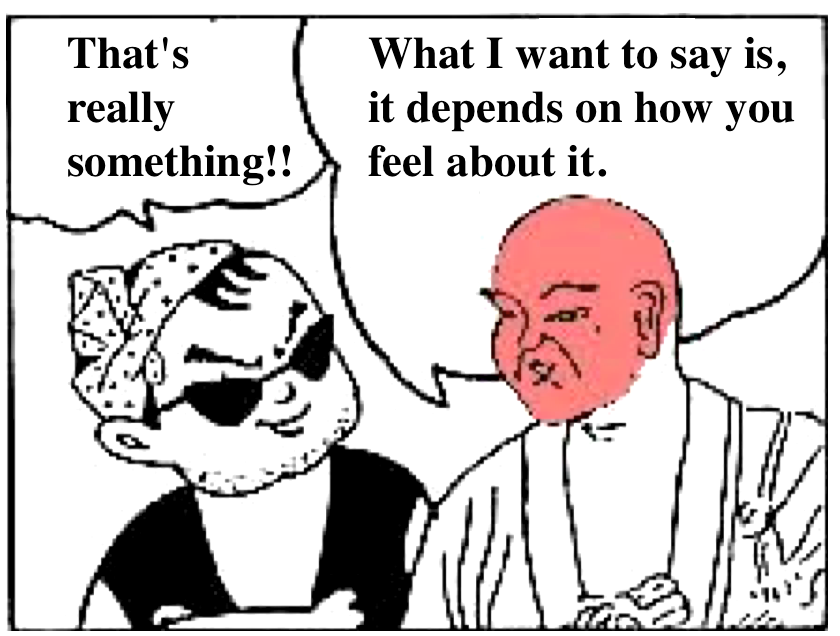

 ☆
☆